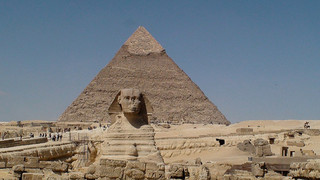 MEDIA ROOTS — Graham Hancock, arguably the world’s foremost expert on ancient mysteries, has devoted his life to uncovering and demystifying the rituals, legends, and wisdom of ancient cultures. In this video, he investigates oft-ignored inconsistencies. For example, he discusses the true age of the Great Sphinx of Giza, which remains under debate. Scholars’ estimates vary widely, though mainstream Egyptologists generally believe it was constructed approximately 4,500 years ago, whereas Hancock asserts heavy water erosion indicates the Sphinx was built quite earlier than believed, at a time when the Giza Plateau wasn’t even a desert yet.
MEDIA ROOTS — Graham Hancock, arguably the world’s foremost expert on ancient mysteries, has devoted his life to uncovering and demystifying the rituals, legends, and wisdom of ancient cultures. In this video, he investigates oft-ignored inconsistencies. For example, he discusses the true age of the Great Sphinx of Giza, which remains under debate. Scholars’ estimates vary widely, though mainstream Egyptologists generally believe it was constructed approximately 4,500 years ago, whereas Hancock asserts heavy water erosion indicates the Sphinx was built quite earlier than believed, at a time when the Giza Plateau wasn’t even a desert yet.
Hancock also questions how Egyptian culture could have attained, such an advanced state so quickly. As he explains, cultures generally undergo evolutionary processes before reaching a point of historic greatness or iconic status. There is usually a progression, in which the building blocks of a society are gradually created over time, giving rise to increased sophistication as the civilization matures. However, with ancient Egypt this does not seem to be the case. Egypt seemingly appeared out of nowhere, complete with massive, architectural wonders, a complex mythology, and an eerily accurate astronomy. Yet, no concrete evidence links Egypt to a previous culture. So, where did ancient Egyptians develop their wisdom? Or should we be asking: Where did the Egyptians come from?
In the video, Hancock lays out a fascinating theory. He believes an ancient culture existed far earlier than contemporary scientists believe, which laid the foundation for Egyptian civilization. He suggests around the end of the last ice age, approximately 10,500 BCE, a cataclysmic natural disaster altered the course of mankind by disrupting this ancient culture. Because most people at this time were living close to water, flooding from the disaster killed the vast majority of them. However, the small minority, which survived retained the wisdom of their antecedents.
Who were these people? Hancock believes they were from Atlantis, the mythical lost island, which most scholars have concluded to be non-existent. For example, Alex Cameron wrote in Greek Mythography in the Roman World (124), “It is only in modern times that people have taken the Atlantis story seriously; no one did so in antiquity.”
Hancock also investigates a number of other ancient artifacts, mysterious discoveries, and cultural anomalies. With cultivated elocution and an erudite demeanor, Hancock tempers his non-traditional theories with cool, detached logic and reasoning. Whether one’s persuaded by him or not, one can’t deny his ability to bring excitement and attention to the study of ancient cultures. For example, Hancock tells us ancient cultures were much more in tune with nature, astronomy, and the Earth itself, all of which helped shape their worldview. Consequently, their wisdom and spirituality was much deeper and more encompassing than modern cultures. In fact, Hancock’s theories may cause you to wonder whether humanity has progressed at all since the time of the ancients.
Written by Adam Miezio
Edited by Alex Starace
***
***
Photo by Flickr user S W Ellis











oh, brother~
What a pity Graham uses the term “Atlantis.” It immediately conjures up all the loopiness which has surrounded the subject in recent times, and he therefore devalues much of genuine interest that he may have to say. Plato’s Atlantis story almost certainly concerns Minoan Crete which he describes with great accuracy – the only thing which throws it out of sync is the enormous age of the civilisation – 9500 years before his time. It is only recently that evidence of a global superflood (as Graham calls it) has come to light. Whatever civilisation existed at that time was certainly not Plato’s Atlantis – it was something entirely different.
Regardless of that, Graham is recapping on his earlier books, which I think is a very good idea – it is now possibly time to re-evaluate his theories in light of more recent discoveries, eg Gobleke Tepe in SE Turkey, a temple complex which existed over 12,000 years ago.
There is definitely something in all this – keep up the good work, Graham.